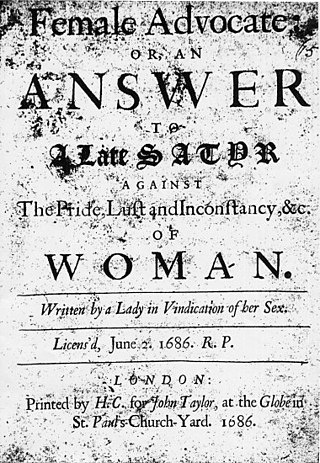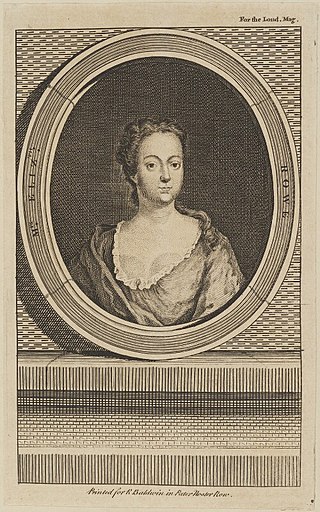
Sir Thomas Wyatt was a 16th-century English politician, ambassador, and lyric poet credited with introducing the sonnet to English literature. He was born at Allington Castle near Maidstone in Kent, though the family was originally from Yorkshire. His family adopted the Lancastrian side in the Wars of the Roses. His mother was Anne Skinner, and his father Henry, who had earlier been imprisoned and tortured by Richard III, had been a Privy Councillor of Henry VII and remained a trusted adviser when Henry VIII ascended the throne in 1509.
Events from the year 1714 in literature.
This article contains information about the literary events and publications of 1708.
This article contains information about the literary events and publications of 1709.

Field Marshal Sir Robert Rich, 4th Baronet was a British cavalry officer. As a junior officer he fought at the Battle of Schellenberg and at the Battle of Blenheim during the War of the Spanish Succession. He was then asked to raise a regiment to combat the threat from the Jacobite rising of 1715. He also served with the Pragmatic Army under the Earl of Stair at the Battle of Dettingen during the War of the Austrian Succession. As a Member of Parliament he represented three different constituencies but never attained political office.
Sir Francis Dashwood, 1st Baronet, of St. Botolph without Bishopsgate, London, and West Wycombe, Buckinghamshire, was a British merchant, landowner and Whig politician who sat in the House of Commons from 1708 to 1713.
Sarah, Lady Piers was an English literary patron, political commentator, and a poet.

Sarah Fyge Egerton (1668–1723) was an English poet who wrote in the late seventeenth and early eighteenth centuries. In her works The Female Advocate and Poems on Several Occasions, Egerton wrote about gender, friendship, marriage, religion, education, politics, and other topics. She is chiefly known as the spirited teen who responded in defense of women to Robert Gould's misogynist satire.
Mary, Lady Chudleigh was an English poet who belonged to an intellectual circle that included Mary Astell, Elizabeth Thomas, Judith Drake, Elizabeth Elstob, Lady Mary Wortley Montagu, and John Norris. In her later years she published a volume of poetry and two volumes of essays, all dealing with feminist themes. Two of her books were published in four editions during the last ten years of her life. Her poetry on the subject of human relationships and reactions has appeared in several anthologies. Her feminist essays are still in print.

Elizabeth Singer Rowe was an English poet, essayist and fiction writer called "the ornament of her sex and age" and the "Heavenly Singer". She was among 18th-century England's most widely read authors. She wrote mainly religious poetry, but her best-known work, Friendship in Death (1728), is a Jansenist miscellany of imaginary letters from the dead to the living. Despite a posthumous reputation as a pious, bereaved recluse, Rowe corresponded widely and was involved in local concerns at Frome in her native Somerset. She remained popular into the 19th century on both sides of the Atlantic and in translation. Though little read today, scholars have called her stylistically and thematically radical for her time.

Elizabeth Thomas was a British poet and letter writer. She was part of an important artistic group in London and John Dryden named her "Corinna". However, she suffered from lifelong financial precarity, romantic disappointment, and latterly, health problems. Her reputation was damaged by Alexander Pope and she spent three years in a debtor's prison near the end of her life.
Constance Aston Fowler was a 17th-century English manuscript author and anthologist. Born "Constance Aston" about 1621, she was the youngest child of Walter Aston, 1st Lord Aston of Forfar and Gertrude Sadleir, who were a Catholic family. Her home was The Priory at St Thomas, near the family home of Tixal Hall in Staffordshire.
Sir Thomas Culpeper, 3rd Baronet, also known as Colepeper, of Preston Hall, Aylesford, Kent was an English landowner and Whig politician who sat in the English and British House of Commons between 1705 and 1723.
Sir Francis Wythens SL KC of Eltham, Kent was a British judge and politician.
Frances Seymour, Countess of Hertford, later the Duchess of Somerset, was a British courtier and the wife of Algernon Seymour, Earl of Hertford, who became the 7th Duke of Somerset in 1748. She was also known as a poet, literary patron and woman of letters. Her great-aunt by marriage, Anne Finch, Countess of Winchilsea, influenced her literary development. She was also influenced by the poet Elizabeth Singer, with whom she became acquainted in her youth at Longleat, where she grew up.

Diana Astry, was an English diarist and compiler of a recipe book containing 375 recipes acquired from a number of sources including family and friends.
Anne Southwell [née Harris], later called Anne, Lady Southwell, was a poet. Her commonplace book includes a variety of works including political poems, sonnets, occasional verse, and letters to friends.

Elizabeth Teft was the author of a miscellany of occasional, topical, and political poetry. Although little is known of her life, her work has garnered scholarly interest.

Lady Margaret Pennyman born Margaret Angier was an English poet. Her journal records her poetry, her disastrous marriage and the loss of a fortune in an economic French bubble scheme.







